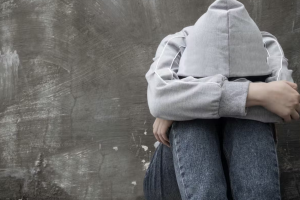Smoking marijuana a few times is not enough to produce any withdrawal symptoms when you stop using it. However, for regular users, things might be different. Heavy and regular marijuana users who quit can experience withdrawal symptoms such as sleep disturbances, mood swings, and problems sleeping.
Heavy marijuana use causes chemical alterations in individuals’ brains, making them physically dependent on it. Such chemical modifications cause strong urges for the drug, so the body presents these uncomfortable symptoms when the person stops taking marijuana. This is why marijuana is so addictive.
The symptoms experienced during marijuana withdrawal are an indication that the body is on the path to recovery. Fortunately, they typically fade away within a few weeks. Some withdrawal symptoms to expect after quitting marijuana include:
 Appetite changes
Appetite changes- Chills and sweats
- Anger and irritability
- Restlessness and anxiety
- Unusual dreams
- Sleep issues
Even though marijuana withdrawal is difficult for users experiencing it, the process does not last for long. This is why it is essential to be kind and patient with oneself as the body gets better.
Problems with Sleep
Once someone stops taking marijuana, they should expect to have a couple of sleepless nights, mainly if they used it to help sleep. Some tips that can help with this symptom of marijuana withdrawal include:
- Staying active throughout the day, even if it includes taking a short walk, can improve one’s sleep and mood while helping with issues like anxiety and stress.
- Reducing screen time just before bed is very effective because the light emitted from screens makes it more difficult for the brain to wind down and get ready for sleep.
- Establish a relaxing bedtime routine every night as a way of informing your body that it is time to rest. You can include calming activities that will help you feel sleepy and relaxed such as watching TV, reading, or taking a warm bath.
- Going to bed and waking up at the exact times every day helps you establish a regular sleep routine. This trains your body to sleep every night at the same time.
It is also common for people who have stopped using marijuana to experience disturbing or strange dreams during the withdrawal period. However, they should go away after about one week, and the above tips can also help you with sleep until they fade away.
Restlessness and Anxiety
 People who take marijuana to help with anxiety will likely start experiencing these symptoms when they stop using the drug. The key is to determine new ways to deal with this anxiety. You can use breathing exercises to help you calm down, while writing your worries down is also effective in managing anxiety.
People who take marijuana to help with anxiety will likely start experiencing these symptoms when they stop using the drug. The key is to determine new ways to deal with this anxiety. You can use breathing exercises to help you calm down, while writing your worries down is also effective in managing anxiety.
It is also advisable to avoid caffeinated drinks such as coffee and tea.
Caffeine can make you anxious and jittery, and without the sedative effects of cannabis, it can amplify this symptom.
Anger and Irritability
Some individuals have reported feeling angry and irritable after stopping marijuana use, which is entirely normal and will pass.
Try to avoid anything that might stress you out in your life and incorporate things that relax you, such as music or exercise. You will also need a source of support, so it will help to tell a family member or a close friend. If you are comfortable, you can disclose that you are experiencing mood changes because of marijuana withdrawal. They can give you the assistance you need during this difficult time.
Chills and Sweats
You may experience flu-like symptoms such as muscle pains, headaches, chills, and sweats when you quit marijuana. The best way to manage this symptom is to take the same measures you would if you had the flu or a cold.
Try to relax and keep warm while ensuring you take lots of fluids. You can also take ibuprofen or paracetamol to deal with any pain or muscle aches you are experiencing.
Appetite Changes
Food will also taste different as you go through marijuana withdrawal, and you may also experience changes to your appetite. If this is the case, you can try smoothies as an alternative or opt to eat tiny amounts of food to build up your appetite. Getting some fresh air and exercise can also help you with this. It is common to have stomach pains and nausea, which typically goes away after one or two weeks.
Currently, there are no approved medications specifically for use during marijuana withdrawal. On the other hand, certain medications can be beneficial for addressing some symptoms of marijuana withdrawal, such as painkillers like paracetamol, Metoclopramide, and Diazepam.
Any psychotic symptoms of marijuana withdrawal can be handled using antipsychotic medications like risperidone or olanzapine for a maximum of two weeks. If the symptoms persist or become severe, it is crucial to seek psychiatric assistance.
Treating marijuana withdrawal also depends on whether the individual has any co-occurring disorders such as other substance abuse disorders or psychiatric health conditions.
Treatment options to consider include:
 Support groups: the individual can find online or local support groups to connect with other people going through the same process.
Support groups: the individual can find online or local support groups to connect with other people going through the same process.- Outpatient therapy: Outpatient rehab programs will involve working with mental health providers and attending regular therapy sessions consistently.
- Detox or rehab centers: These services can help people suffering from co-occurring disorders or severe marijuana use and going through withdrawal.
In conclusion, here are some general points to consider when managing marijuana withdrawal:
- Take plenty of liquids and stay away from any caffeinated or sugary drinks.
- Eat a healthy diet that includes lean protein, vegetables, and fresh fruit. Please stay away from junk food as it can make you even more irritable and sluggish during this time.
- Stay active by taking at least 30 minutes daily to exercise. This is a great way to naturally improve your mood and eliminate any toxins in your body.
- Seek support from loved ones and friends who can help you through the withdrawal period as smoothly and comfortably as possible.


